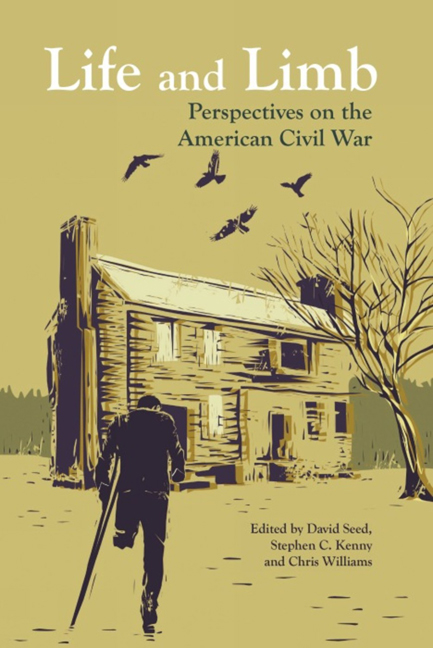Book contents
- Frontmatter
- Contents
- List of Illustrations
- Acknowledgements
- Introduction: Civil War Voices and Views
- MEDICAL AND SURGICAL MEMOIRS
- ACCOUNTS OF NURSING
- MEDICAL FACILITIES AND PATHOLOGY
- Jonathan Letterman on the Medical Corps: Medical Recollections of the Army of the Potomac
- The Confederate Military Prison Hospital at Andersonville, Georgia: Contributions Relating to the Causes and Prevention of Disease
- Field Hospitals: A Glimpse: Hardtack and Coffee
- Field Hospitals: The Need: A Manual of Military Surgery
- Plea for an Ambulance Service: A Brief Plea for an Ambulance System
- Hospital Broadside: North Carolina Hospital Broadside, 1863
- Hospitals in Richmond, Virginia: A Diary from Dixie
- Malingering: ‘Surgical Reminiscences of the Civil War’ and A Rebel's Recollections
- Roberts Bartholomew on Nostalgia: Contributions Relating to the Causes and Prevention of Disease
- Medical Welfare Begins: ‘Debut and Prospectus (The Crutch) and ‘Wounded’ (poem by ‘Sanatosia’)
- (Dis)embodied Identities: Civil War Soldiers, Surgeons, and the Medical Memories of Combat
- PHOTOGRAPHY
- AMPUTATIONS AND PROSTHETIC LIMBS
- IN THE FIELD OF BATTLE
- POST-WAR NARRATIVES
- Contributors
- Select Bibliography
- Index
- Plates
Field Hospitals: The Need: A Manual of Military Surgery
from MEDICAL FACILITIES AND PATHOLOGY
- Frontmatter
- Contents
- List of Illustrations
- Acknowledgements
- Introduction: Civil War Voices and Views
- MEDICAL AND SURGICAL MEMOIRS
- ACCOUNTS OF NURSING
- MEDICAL FACILITIES AND PATHOLOGY
- Jonathan Letterman on the Medical Corps: Medical Recollections of the Army of the Potomac
- The Confederate Military Prison Hospital at Andersonville, Georgia: Contributions Relating to the Causes and Prevention of Disease
- Field Hospitals: A Glimpse: Hardtack and Coffee
- Field Hospitals: The Need: A Manual of Military Surgery
- Plea for an Ambulance Service: A Brief Plea for an Ambulance System
- Hospital Broadside: North Carolina Hospital Broadside, 1863
- Hospitals in Richmond, Virginia: A Diary from Dixie
- Malingering: ‘Surgical Reminiscences of the Civil War’ and A Rebel's Recollections
- Roberts Bartholomew on Nostalgia: Contributions Relating to the Causes and Prevention of Disease
- Medical Welfare Begins: ‘Debut and Prospectus (The Crutch) and ‘Wounded’ (poem by ‘Sanatosia’)
- (Dis)embodied Identities: Civil War Soldiers, Surgeons, and the Medical Memories of Combat
- PHOTOGRAPHY
- AMPUTATIONS AND PROSTHETIC LIMBS
- IN THE FIELD OF BATTLE
- POST-WAR NARRATIVES
- Contributors
- Select Bibliography
- Index
- Plates
Summary
Samuel David Gross (1805–1884) served as a surgeon in Kentucky and Philadelphia, his activities being commemorated in Thomas Eakins’ painting ‘The Gross Clinic.’ The following text is taken from Chapter 4 (‘Medical Equipments, Stores and Hospitals’) of his A Manual of Military Surgery, or Hints on the Emergencies of Field, Camp and Hospital Practice (Philadelphia: J.B. Lippincott, 1861).
William A. Hammond (Surgeon-General of the Army, 1862–64) published A Treatise on Hygiene with Special Reference to the Military Service (Philadelphia: J.B. Lippincott, 1863), which specified the layout of field hospitals, stressing the prime danger of overcrowding. Hammond divides his subject into three sections: the examination of recruits, ‘inherent’ and external agents affecting health. He discusses a whole range of factors ranging from clean air to water filters and the role of alcohol in retarding the degeneration of tissue. In 1862 he founded the Army Medical Museum, but was dismissed from the army in 1864 on charges trumped up by the Secretary of War. After the Civil War Hammond pioneered the study of mental illness.
Besides these means, every regiment should be furnished with an ambulance, or, as the term literally implies, a movable hospital, that is, a place for the temporary accommodation and treatment of the wounded on the field of battle. It should be arranged in the form of a tent, and be provided with all the means and appliances necessary for the prompt succour of the sufferers. The materials of which it consists should be as light as possible, possess every facility for rapid packing and erection, and be conveyed from point to point by a wagon set apart for this object. The ambulance, for the invention and improvement of which we are indebted to two eminent French military surgeons, Percy and Larrey, is indispensable in every well-regulated army. This temporary hospital should be placed in an open space, convenient to water, and upon dry ground, with arrangements for the free admission of air and light, which, next to pure air, is one of the most powerful stimulants in all cases of accident attended with excessive prostration.
- Type
- Chapter
- Information
- Life and LimbPerspectives on the American Civil War, pp. 64 - 65Publisher: Liverpool University PressPrint publication year: 2015



